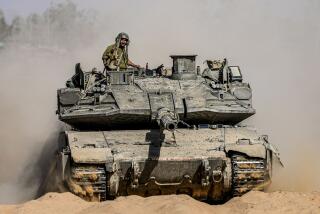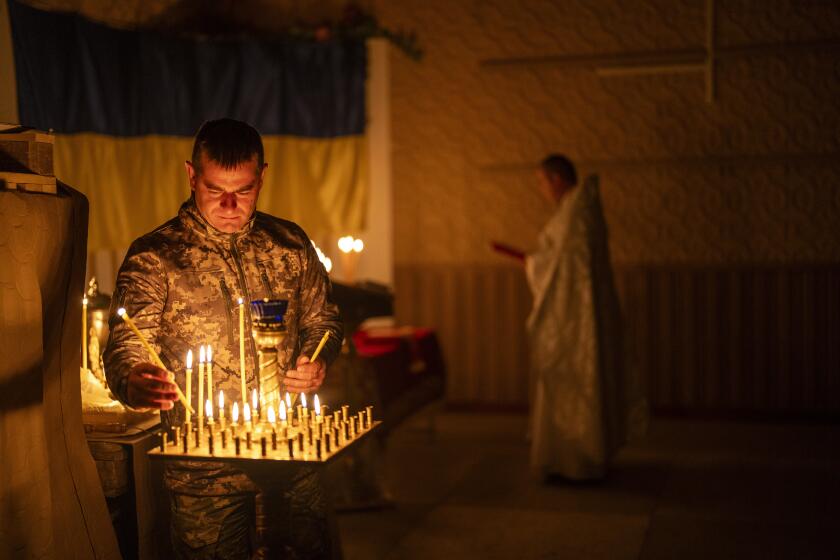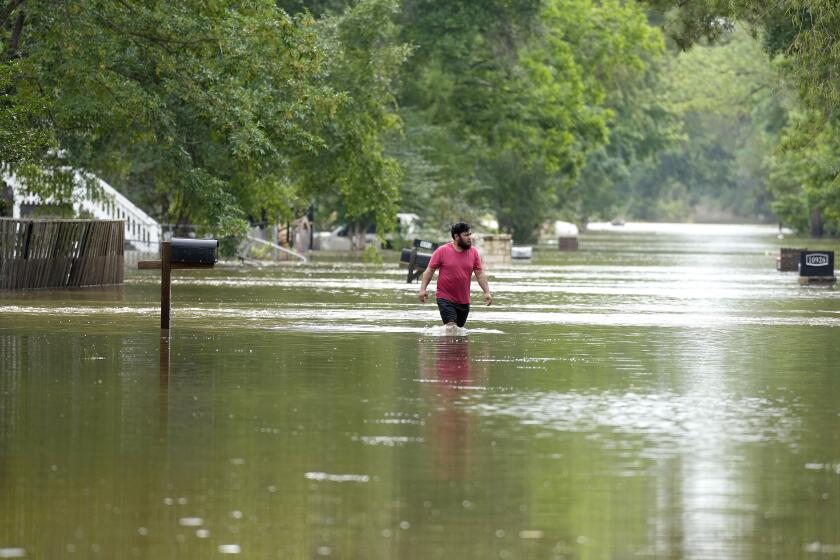THE WORLD / FOREIGN EXCHANGE
Hours after his release from a two-month stint in prison, Sudanese opposition leader Hassan Turabi looked fit and chipper Monday in the reception hall of his Khartoum home.
If he was tired at all, it was from the stream of dignitaries, political leaders and family members who came to celebrate his surprise release.
One of Africa’s most influential and controversial Islamists, Turabi was arrested in January after he called for Sudanese President Omar Hassan Ahmed Bashir to turn himself over to the International Criminal Court to face prosecution over his government’s counter-insurgency campaign in the Darfur region.
Turabi has been in and out of prison for the last 40 years thanks to his Zelig-like tendency to be at the center of most of the nation’s post-independence coups. He helped Bashir topple the elected government in 1989, was instrumental in imposing Islamic law and was dubbed the “Pope of Terrorism” for inviting Islamic extremists such as Osama bin Laden to live in Sudan during the 1990s.
After a political break with Bashir in 1999, his views have become more moderate and he has called for democratic reforms. He’s also emerged as the government’s most outspoken critic.
But if Bashir hoped that a couple of months in solitary confinement would quiet the 76-year-old Turabi, he’ll be disappointed. During an interview Monday with The Times, Turabi reiterated his support for the ICC case, called the Sudanese leader an “autocrat” and said the crisis had left the government in disarray.
How were you treated? You’ve said in the past you don’t always mind jail because it gives you a chance to read and reflect.
I’ve been detained many times, but this time was the worst. They close you up in a room by yourself. They denied me radio. They denied me even something to read.
Why were you released?
Why was I detained? Do you think they deliberate on these things and then come to a resolution? They don’t. It’s all temperamental. It’s the whim of the president. They probably arrested me because I was one of the only voices for international justice, though they never allowed my statements to [be reported in the Sudanese media]. There is a state of confusion now. They react. They say terrible things against the world. They have become a little bit irrational. They probably thought [my arrest] could consolidate public opinion, but nobody is behind them. People just come when they are told to come for assemblies and repeat the slogans. It reminds me of the time of [Sudanese President Jaafar Numeiri, who was toppled by popular uprisings in 1985]. The day he collapsed, his party completely disbanded.
You think support for Bashir’s ruling party is that shallow?
Surely.
Has the ICC arrest warrant against Bashir made him stronger or weaker?
Public opinion now has almost canceled the legitimacy of this whole regime. They are much weaker. This may unfortunately encourage regional resistance.
What do you mean?
I don’t know what will happen in the south. [Former southern rebels in the Sudan People’s Liberation Movement have formed a fragile unity government with Bashir’s ruling party.] They are staying away right now. But if things get very bad, they may go completely for a state of independence.
Now he’s even lost support of the Egyptians, who wanted to organize a conference [about the ICC arrest warrant], but the government said they would not go. He’s using no diplomacy at all.
It doesn’t sound as if jail has silenced you.
They must know by now that you don’t silence someone by sending them to jail. Probably it makes them more outspoken.
You were just about the only voice in Sudan to endorse the ICC case against Bashir. Do you still feel that way?
Yes, of course. International relations are based on justice. People are saying, “They are against the country.” It’s not against the company, it’s against the manager. This is against an individual. Don’t tell me that if we lose him, we lose the whole country. We have a constitution.
Don’t you worry that they will send you back to jail for saying things like that?
You can’t predict what they will do because they don’t think logically. They may do it. They may not.
You once said that former friends make the bitterest enemies. Do you think that plays a role in your friction with Bashir?
We differ on principles. Democracy. Elections. He’s a soldier. He’s an autocrat who believes in highly concentrated power.
Why has the opposition been so quiet about the ICC or supportive of Bashir?
They’ve shied away from it. They’ve been paid or bought, and they probably fear detention.
Some in the West predict that the ICC case will prompt a coup or regime change. What do you think?
There are so many armies and armed forces. The southerners have their own. The Westerners. The U.N. and the international forces. It’s not a country where there is just one army that might think about it. That makes it difficult.
The government is expelling more than a dozen aid groups. Do you think we’ll see more of that kind of action?
They don’t know what they are doing. There is a sense of crisis. They are confused. It was probably an act of temper.
Will the ICC case help or hurt the peace process in Darfur?
It will make the rebels be sharper and more aggressive, and less likely to negotiate. They will feel as though the political legitimacy of the system is now in doubt.
What will you do next?
People are worried now about the whole country. I don’t mind talking to anyone; even if the president asks me, I’ll advise him and say my words plainly. I’d advise him to behave better.
Do you think those in the government would seek your advice?
Not officially.
Probably in the next few days some will come in the night to see me. They keep it very private.
--
More to Read
Start your day right
Sign up for Essential California for news, features and recommendations from the L.A. Times and beyond in your inbox six days a week.
You may occasionally receive promotional content from the Los Angeles Times.





